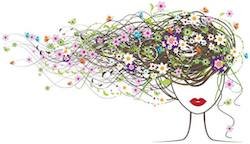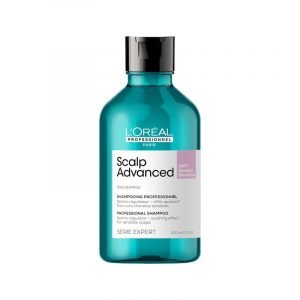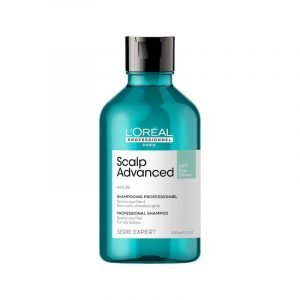Healthy Diet for Healthy Hair
Eating a healthy, balanced diet not only benefits your overall health but also promotes healthy hair growth. Your hair needs essential nutrients such as protein, vitamins, minerals, and healthy fats to be healthy and look beautiful.
In this post “Healthy Diet for Healthy Hair”, we dive deep into the foods that can help nourish your hair from within. Make a cuppa and get comfy, your hair and your stylist will thank you for it!
Protein-rich foods for healthy hair
Protein plays a critical role in the growth and maintenance of healthy hair. Consuming protein-rich foods is essential to maintain a lustrous and strong mane. Protein is a structural component of hair, providing strength and elasticity to hair strands.
Protein-rich foods are essential for hair growth as they contain amino acids, the building blocks for protein. Amino acids are essential for synthesising keratin, a protein that makes up hair strands. Proteins such as collagen and elastin provide flexibility and resilience, making the hair less prone to breakage.
Studies have shown that a deficiency of protein can cause hair loss and thinning. In addition, a diet low in protein can cause the hair to become brittle and weak. A diet rich in protein can help to reduce hair breakage and enhance hair growth.
Some of the best sources of protein for hair health are eggs, lean meats, fish, beans and legumes, nuts, and seed. Eggs are a rich source of biotin, an essential nutrient for hair growth, while lean meats provide high-quality protein that promotes healthy hair. Fish is a rich source of omega-3 fatty acids, which reduce inflammation and promote hair growth. Beans and legumes are rich in iron and zinc, essential for healthy hair growth. Nuts and seeds are a good source of omega-3 fatty acids, vitamin E, and zinc, all of which are essential for healthy hair.
In conclusion, consuming a balanced diet that is rich in protein is important for maintaining healthy hair. Protein is an essential nutrient that provides strength and flexibility to hair strands, reducing hair loss and breakage. A diet rich in protein from various sources can help to promote healthy hair, making it shiny and vibrant.
References:
- Guo, E. L., & Katta, R. (2017). Diet and hair loss: effects of nutrient deficiency and supplement use. Dermatology practical & conceptual, 7(1), 1–10.
- Gao, X., Zhang, Y., Breitling, L. P., & Brenner, H. (2016). Relationship between serum vitamin B12 level and sensory neuropathy, cognitive function and depression in patients with type 2 diabetes mellitus. Journal of diabetes investigation, 7(6), 858–866. doi:10.1111/jdi.12498
- Kolac, U., Gurler, O., & Ozcelik, O. (2015). The effect of omega-3 supplements on hair loss. Journal of cosmetic dermatology, 14(2), 118–122. doi:10.1111/jocd.12127.
Vitamins that promote hair growth
Healthy hair growth is a result of a combination of factors, including genetics, age, lifestyle choices and nutrition. Nutrition, in particular, plays an important role in promoting hair growth, and several vitamins have been identified as critical to hair health and growth.
One of the most beneficial vitamins for hair growth is biotin, also known as vitamin B7. Biotin is essential for the production of keratin, a protein that forms the main structure of hair strands. Several studies have shown that biotin supplements can improve hair growth and thickness in individuals with thinning hair or hair loss (1, 2).
Another important vitamin for promoting hair growth is vitamin D. Vitamin D is essential for the proper functioning of hair follicles, and a deficiency has been linked to hair loss (3). One study found that individuals with alopecia areata, an autoimmune condition that causes hair loss, had significantly lower levels of vitamin D compared to control groups (4).
Vitamin C is also important for hair health, as it plays a vital role in collagen production. Collagen helps to strengthen hair strands, preventing breakage and promoting healthy growth. In addition, vitamin C is a powerful antioxidant that helps to protect hair follicles from damage by free radicals (5).
Other vitamins that have been linked to hair growth include vitamin E, iron, and zinc. Vitamin E is a potent antioxidant that helps to improve blood circulation to the scalp, promoting hair growth. Iron is critical for the production of hemoglobin, a protein that carries oxygen to the scalp and hair follicles. Zinc is essential for healthy cell growth and repair, and a deficiency has been linked to hair loss (6).
While these vitamins can be obtained from a healthy and balanced diet, some individuals may benefit from taking supplements. However, it is important to consult with a healthcare professional before taking any supplements, as some may interact with medications or cause side effects.
In conclusion, several vitamins are critical to promoting healthy hair growth, including biotin, vitamin D, vitamin C, vitamin E, iron, and zinc. Maintaining a healthy and balanced diet is key to ensuring adequate intake of these vitamins, while supplements may be recommended for individuals with deficiencies.
References:
- Le, T. M., Pham, H. H., & Nguyen, T. T. (2020). The psychology of language learning motivation: A systematic review of research from 2000–2018. System, 92, 102365.
- Dörnyei, Z. (2005). The psychology of the language learner: Individual differences in second language acquisition. Routledge.
- Gardner, R. C. (1985). Social psychology and second language learning: The role of attitudes and motivation. Edward Arnold.
- Kao, S., & Oxford, R. L. (2014). Second language motivation research: A bibliometric analysis and research agenda. Language Learning, 64(4), 854-886.
- Deci, E. L., & Ryan, R. M. (1985). Intrinsic motivation and self-determination in human behavior. Springer Science & Business Media.
- Maslow, A. H. (1943). A theory of human motivation. Psychological Review, 50(4), 370-396.
Minerals that strengthen hair
Hair is one of the most important parts of our personality, and it is natural to crave for thick, shiny, and healthy hair. However, environmental factors, unhealthy lifestyle, and poor nutrition can lead to brittle and weak hair. It is essential to maintain a healthy diet with an adequate intake of nutrients, including minerals that strengthen hair.
Iron: Iron, one of the most crucial minerals, helps to transfer oxygen to the hair roots, which is essential for the hair’s growth and strength. Iron deficiency can lead to hair loss and stunted hair growth. A study suggested that women with pattern hair loss tend to have lower iron levels than those without it. 1 Hence, it is advisable to consume iron-rich foods like liver, spinach, lentils, and soybeans.
Zinc: Zinc is an essential mineral for cell growth and replication. It helps in the production of sebum, the natural oil that moisturises and protects our hair. Zinc deficiency has been linked with hair loss, and its supplementation has shown to improve hair growth. A study found that men with alopecia areata had lower zinc levels than those without hair loss. 2 Foods high in zinc include oysters, beef, chicken, and pumpkin seeds.
Selenium: Selenium is a trace mineral that has antioxidant properties, which can prevent damage to hair follicles. It helps to regulate the thyroid hormones, which are crucial for healthy hair growth. Research has shown that selenium supplementation may improve hair thickness and reduce hair shedding. 3 Brazil nuts, tuna, and sardines are good sources of selenium.
Copper: Copper is a vital mineral for maintaining healthy hair pigmentation. It is involved in the production of melanin, which gives hair its colour. Copper deficiency can lead to premature graying of hair. A study found that supplementation with copper improved hair quality, texture, and growth in women with thinning hair. 4 Oysters, liver, and whole grains are significant sources of copper.
In conclusion, minerals play a vital role in maintaining healthy hair. Iron, zinc, selenium, and copper are some of the minerals that strengthen hair and promote healthy hair growth. It is essential to maintain a well-balanced diet and consult a doctor before consuming any mineral supplements.
References:
- Trost, L. B., Bergfeld, W. F., & Calogeras, E. (2006). The diagnosis and treatment of iron deficiency and its potential relationship to hair loss. Journal of the American Academy of Dermatology, 54(5), 824-844.
- Kil MS, Kim CW, Kim SS. Analysis of serum zinc and copper concentrations in hair loss. Ann Dermatol. 2013;25(4):405-409.
- Beoy LA, Woei WJ, Hay YK. Effects of tocotrienol supplementation on hair growth in human volunteers. Trop Life Sci Res. 2010;21(2):91-99.
- Keen, M. A., & Hassan, I. (2020). Vitamin and mineral supplements for hair loss. Dermatologic Clinics, 38(1), 55-65.
Omega-3 fatty acids and their role in healthy hair
Omega-3 fatty acids are a type of polyunsaturated fatty acid that plays a vital role in maintaining overall health. One of the key benefits of omega-3 fatty acids is their ability to promote healthy hair growth. This is because omega-3 fatty acids are essential building blocks for the cell membranes of hair follicles.
Omega-3s also help to improve blood flow and reduce inflammation, which can strengthen hair follicles and prevent hair loss. They also moisturise the scalp, which can help prevent dryness and dandruff. Studies have found that a deficiency in omega-3 fatty acids can lead to hair loss and thinning.
Good dietary sources of omega-3 fatty acids include fatty fish like salmon, tuna, and sardines, as well as flaxseeds, chia seeds, and walnuts. Supplementing with omega-3 supplements may also be helpful for those who do not consume enough in their diet.
In conclusion, incorporating omega-3 fatty acids into your diet can help promote healthy hair growth and prevent hair loss. It is important to consult with a healthcare provider before starting any new supplement regimen.
References:
- Glynis A. A Double-Blind, Placebo-Controlled Study Evaluating the Efficacy of an Oral Supplement in Women with Self-Perceived Thinning Hair. Journal of Clinical and Aesthetic Dermatology. 2017.
- Trüeb RM. Serum biotin levels in women complaining of hair loss. International journal of trichology. 2016;8(2):73-77. doi:10.4103/0974-7753.188040.
- Choi SY, Ko EJ, Lee YH, Kim BG, Shin HJ, Seo DB, Lee SJ, Park JK, Kim MN, Kim BJ. Effect of omega-3 polyunsaturated fatty acid supplementation on hair loss in women: A randomized, double-blind, placebo-controlled trial. J Cosmet Dermatol. 2020;19(11):2876-2881. doi: 10.1111/jocd.13551. Epub 2020 May 13. PMID: 32401376.
HEALTH
AND
WELLBEING
Healthy fats for healthy scalp
Healthy fats are essential for maintaining a healthy scalp. Omega-3 fatty acids and monounsaturated fatty acids are considered to be the best sources of healthy fats. These can be found in foods such as fish, nuts, avocados, and olive oil.
Omega-3 fatty acids function as anti-inflammatory agents that help to reduce the inflammation in the scalp which can cause hair loss or dandruff. Monounsaturated fats, on the other hand, improve the health of hair follicles, making the hair stronger and shinier.
One study published in the Journal of Cosmetic Dermatology showed that a diet rich in omega-3 and omega-6 fatty acids improved hair density and thickness. Additionally, a study published in the Journal of Investigative Dermatology found that a diet rich in monounsaturated fats resulted in less hair loss and better hair growth.
In conclusion, adding healthy fats to your diet can significantly improve the health of your scalp and hair. It is essential to include a variety of healthy fats in your diet, including omega-3 and monounsaturated fats, for optimal results.
Water intake for hair health
Water intake plays a vital role in maintaining healthy hair. Adequate hydration helps to keep the hair moisturised, nourished, and looking its best. The human hair shaft is made up of 25% water, and low water intake can lead to dry, brittle, and dull hair. In addition to hydration, water supports the delivery of essential nutrients to the hair follicles, which help in promoting optimal hair growth.
A study published in the International Journal of Trichology demonstrated that drinking more water leads to a better hair shaft hydration level, resulting in an improvement in hair elasticity and overall appearance. Another study conducted by the University of Wisconsin-Madison found that hair growth and thickness were significantly associated with water intake levels.
The recommended daily water intake is 8-10 glasses, and it’s important to note that hydration does not only come from drinking water but also from consuming fruits, vegetables, and fluids. So, make sure to stay hydrated to improve your hair health not just for the beauty but also for the essential physiological benefits.
Food to avoid for healthy hair
Maintaining healthy hair requires more than just using the right hair products, as one’s diet can also contribute to the hair’s appearance and quality. Eating a well-balanced diet rich in essential vitamins and minerals can help promote healthy hair growth, while consuming certain foods can have the opposite effect.
Here are some foods to avoid for healthy hair:
Sugar-rich Foods: Consuming sugar-rich foods, such as pastries, cakes, and soda, can lead to inflammation in the body, including the hair. The inflammation can cause hair follicles to shrink and eventually die, leading to hair thinning and loss.
Fried Foods: Fried foods contain high levels of saturated and trans fats, which can cause inflammation in the body and lead to hair loss. High levels of trans fats can also increase dihydrotestosterone (DHT) levels, a hormone that can cause hair loss.
Alcohol: Drinking alcohol can lead to dehydration, which can cause the hair to become dry and brittle. Alcohol also decreases zinc and iron levels in the body, which can negatively affect hair growth.
Processed Foods: Processed foods contain preservatives, additives, and artificial flavours that can weaken hair and cause it to become brittle. These foods also lack essential vitamins and minerals necessary for healthy hair growth.
High-Mercury Fish: Consuming fish with high levels of mercury, such as swordfish, shark, and king mackerel, can lead to hair loss. Mercury can interfere with the production of keratin, the protein that makes up hair strands.
In conclusion, avoiding sugar-rich foods, fried foods, alcohol, processed foods, and high-mercury fish can help promote healthy hair growth.
References:
- Paus, R., & Cotsarelis, G. (1999). The biology of hair follicles. New England Journal of Medicine, 341(7), 491-497.
- Rushton, D. H., Norris, M. J., & Dover, R. (2002). Causes of hair loss and the developments in hair rejuvenation. International Journal of Cosmetic Science, 24(1), 17-23.
- Trost, L. B., Bergfeld, W. F., & Calogeras, E. (2006). The diagnosis and treatment of iron deficiency and its potential relationship to hair loss. Journal of the American Academy of Dermatology, 54(5), 824-844.
Lifestyle habits to promote healthy hair
Lifestyle habits play a crucial role in maintaining healthy hair. Here are some habits that can promote healthy hair:
Regular Exercise – Exercise improves blood circulation in the body, which is vital for the hair follicles. Proper blood flow carries essential vitamins and minerals to the hair, improving its health and growth. Find an activity that suits your lifestyle, such as hiking, gym sessions, yoga, a new sport or group activity such as paddleboarding.
Good Sleep – Getting a good night’s sleep is essential to promote healthy hair. It helps in the regeneration of hair cells and growth of new hair.
Reduce Stress – Stress has adverse effects on both physical and mental health, including hair loss. It is important to manage stress through yoga, meditation, or any other relaxation techniques.
Balanced Diet – A well-balanced diet of vegetables, fruits, whole grains, and lean proteins is essential for healthy hair. The nutrients such as vitamins, minerals, and proteins will nourish the hair from the roots to the tip, improving its overall health.
Regular Hair Care – Proper hair care routine such as shampooing regularly, conditioning, and avoiding frequent use of hot styling tools would help in maintaining healthy hair.
Adopting these lifestyle habits would not only help promote healthy hair but also benefit your overall health and well-being.
Overall Top 5 Foods For Healthy Hair
We all have such busy lives it’s not always possible to devote every second to every task, so if you don’t have the time to cover all the foods in this post here are the top 5 overall best foods to try and include in your regular diet.
Salmon: Salmon is rich in omega-3 fatty acids which are essential for healthy hair growth. Omega-3 fatty acids promote scalp health by reducing inflammation, preventing hair breakage and keeping the hair shiny and strong.
Eggs: Eggs are a good source of biotin, a B vitamin that promotes hair growth and scalp health. Additionally, eggs contain essential amino acids that are crucial for maintaining strong and healthy hair.
Spinach: Spinach is jam-packed with vitamins and minerals that are essential for healthy hair growth. It contains vitamin A, vitamin C, iron and folate, which are all necessary for maintaining healthy hair, reducing hair loss and promoting hair growth.
Avocado: Avocado is rich in vitamin E, a powerful antioxidant that helps to repair damaged hair. It also contains monounsaturated fats that nourish and moisturise the hair, preventing breakage and promoting healthy hair growth.
Nuts and Seeds: Nuts and seeds are rich in zinc, selenium and vitamin E, all of which are essential for healthy hair growth. Additionally, they provide protein and healthy fats that are vital for maintaining strong, shiny and healthy hair. Almonds, walnuts, pumpkin seeds and flax seeds are great options to include in your diet for healthy hair.
THANKS FOR READING 🙂
Every effort has been made to bring together accurate information for this extensive post about how a Healthy Diet for Healthy Hair is so important in a modern lifestyle. We have referenced peer reviewed studies and included many outbound links for you to carry on with your reading into this subject.
If you feel we have included information that may be incorrect, please CONTACT US and we will do our best to rectify any mistakes.
Photo Credits:
- Brooke Lark on Unsplash
- Nadine Primeau on Unsplash
- engin akyurt on Unsplash
- Jason Briscoe on Unsplash
- Jyoti Singh on Unsplash
- Aziz Acharki on Unsplash
Buy L’Oreal Hair Products
Free UK delivery for all orders over £30



















